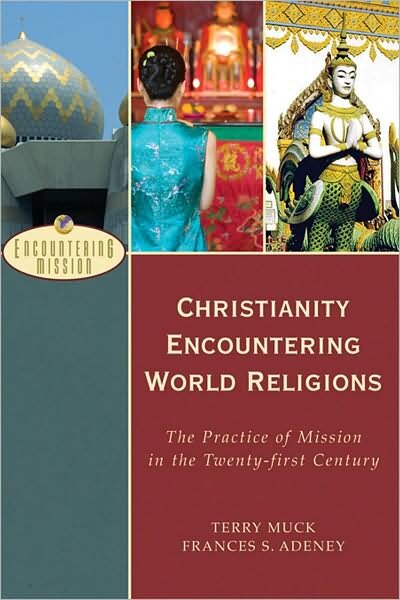Terry Muck and Frances S. Adeney, Christianity Encountering World Religions: The Practice of Mission in the Twenty-first Century. Baker Academic, 2009.
Referenced in: Evangelism in Contemporary Culture – Special Challenges
LifeandLeadership.com Summary
The LifeandLeadership.com Ministry Resource Guides are not focused on global missions or interfaith dialogue, but upon work within established churches in North America, primarily the U.S. Yet it is naïve to fail to acknowledge how “glocal” (i.e. global diversity becoming local reality) the ministry settings in North America have become. Local churches now coexist with what were once called “world” religions. Increasingly, these religions have become local, forcing us to engage the dual task of faithfully distinguishing Christianity from other worldviews while finding points of intersection.
However, even if one’s local context does not involve interfaith exchanges, most current evangelistic contexts are likely to place Christianity amidst competing truth claims, both secular and religious. As the authors say:
“Three idea clusters define this new mission context: We exist in an increasingly free marketplace of religious ideas; we do missions in a nexus of competing evangelisms resulting in what we might call reflective evangelism; and the mode of Christian interchanges with other religions is both to compete and cooperate with them.” (16)
In some cases missionaries may experience hostility, but probably all will face indifference or trivialization toward Christian proclamation.
This makes the biblical encounters with world religions very instructive for evangelism today. Muck looks closely at these encounters. It is excellent for those who must substantively rethink evangelism in contexts that involve clashes between competing worldviews.
Part One lays out the biblical and theological method. We often forget that “the Bible records 239 occasions when the people of God…come into contact with other religious traditions,” [the appendix lists and describes each of these] and most of the time, these encounters were “conflictual rather than cooperative.” (33)
In Part Two, the authors mine out of these texts “eleven Christian mission practices that seem to be present in all faithful, successful Christian mission efforts to people of other religions. Together these eleven practices constitute the how-to of ‘giftive mission.’” (78)
Part two outlines the eleven practices in separate chapters:
- Universality: Reaching out to all, including Christians
- Fellowship: Belonging precedes believing
- Localization: Focusing on questions and concerns of the local community
- Commitment: Holding ideas with conviction; acting decisively on those ideas; not letting those ideas be divisive
- Freedom: Honoring the principle of religious choice
- Effectiveness: Allowing the context to determine the form of witness
- Consistency: Striving for consistency between methods and goals
- Variety: Communicating the gospel in many forms
- Respect: Not disparaging others in order to champion your own; not disparaging your own in order to respect others
- Charity: Loving those to whom we witness
- Missional ecumenicity: Practicing mission as the joint project of the church
These are followed by a chapter on how Jesus, as a mission innovator, models giftive mission.
Part Three discusses a spiral of five stages those who engage giftive mission progress as they learn through their experiences. Part Four develops biblical rationale of the “giftive mission” metaphor, the sociology of reciprocal exchange in missions, and a final apologetic for using “giftive mission” as a missiological lens.
From the Publisher
The current religious climate poses unique challenges to those engaged in mission. Thus the authors of this book propose a new, yet very biblical, model for interacting with people of other faiths. They term this model “giftive mission,” as it is based on the metaphor of free gift. We bear the greatest gift possible – the gospel message. Adopting this perspective not only has the potential for greater missionary success but also enables us to more closely imitate God’s gracious activity in the world. The core of the book explores eleven practices that characterize giftive mission. Each practice is illustrated through the story of a figure from mission history who embodied that practice. Further discussion shows how to incorporate these practices in specific mission settings.
About the Authors
Terry Muck (PhD, Northwestern University) is dean of the E. Stanley Jones School of World Mission and Evangelism at Asbury Theological Seminary. He is the author of nine books, including Ministry and Theology in Global Perspective: Contemporary Challenges for the Church.
Frances S. Adeney (PhD, Graduate Theological Union) is William A. Benfield Jr. Professor of Evangelism and Global Mission at Louisville Presbyterian Theological Seminary. She has authored and/or contributed to many books, including Christian Women in Indonesia: A Narrative Study of Gender and Religion and Christianity and Human Rights: Influences and Issues.
***For additional information on this resource, including reviews, click the bookstore links. Check the reference at page top or the links below for resource guides on related topics.***
Related Areas
See Other Resources on Evangelism:
See Resources on Over 100 Areas of Ministry Leadership:


